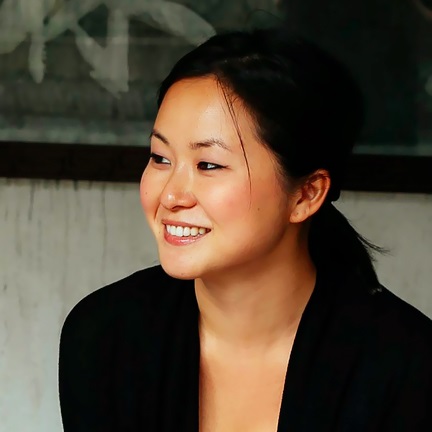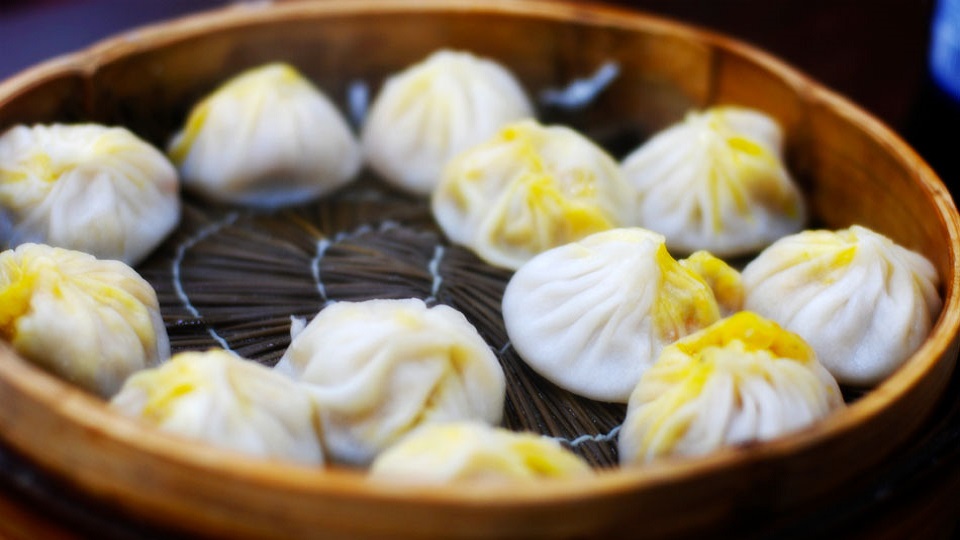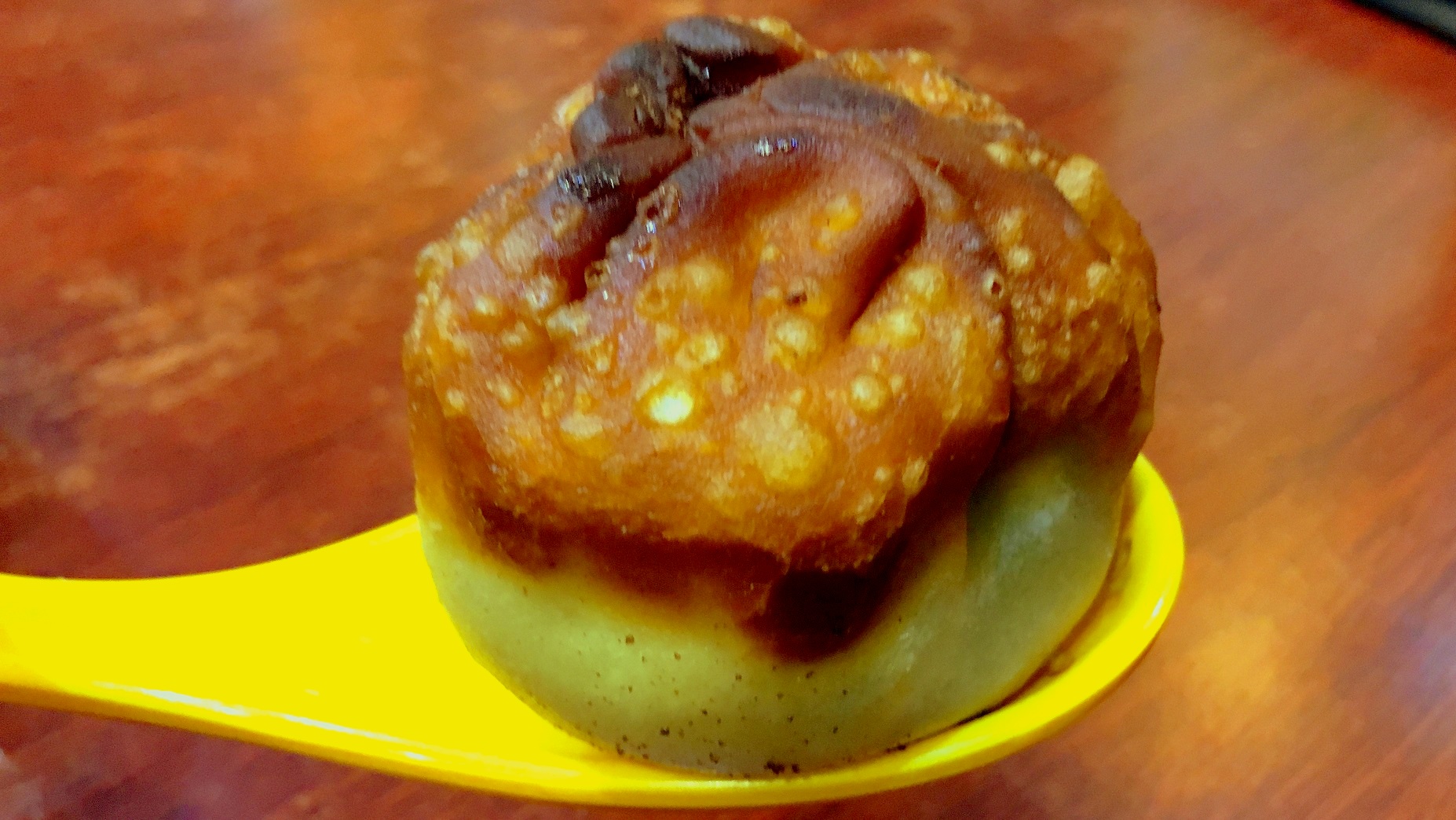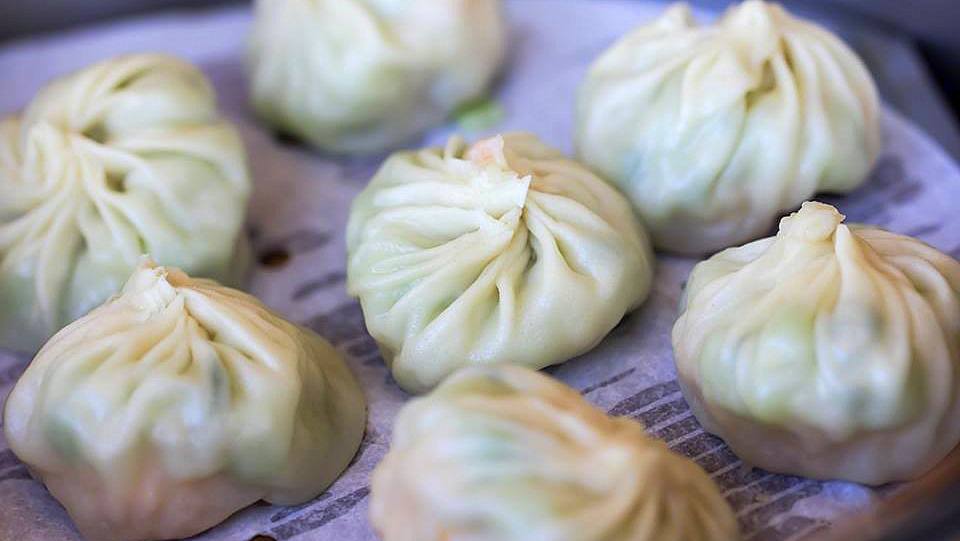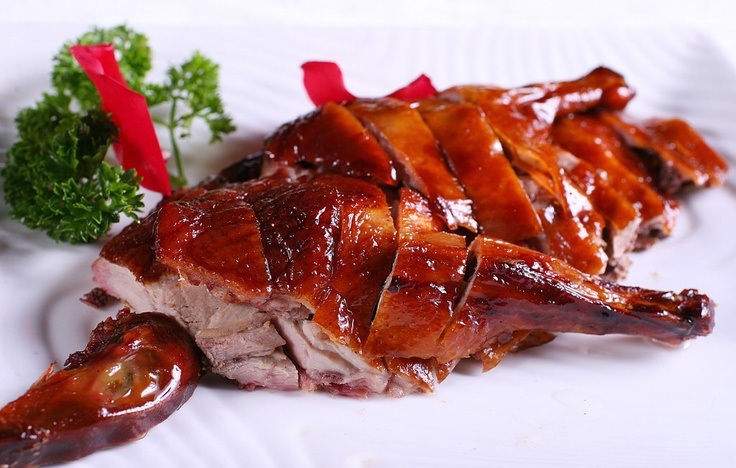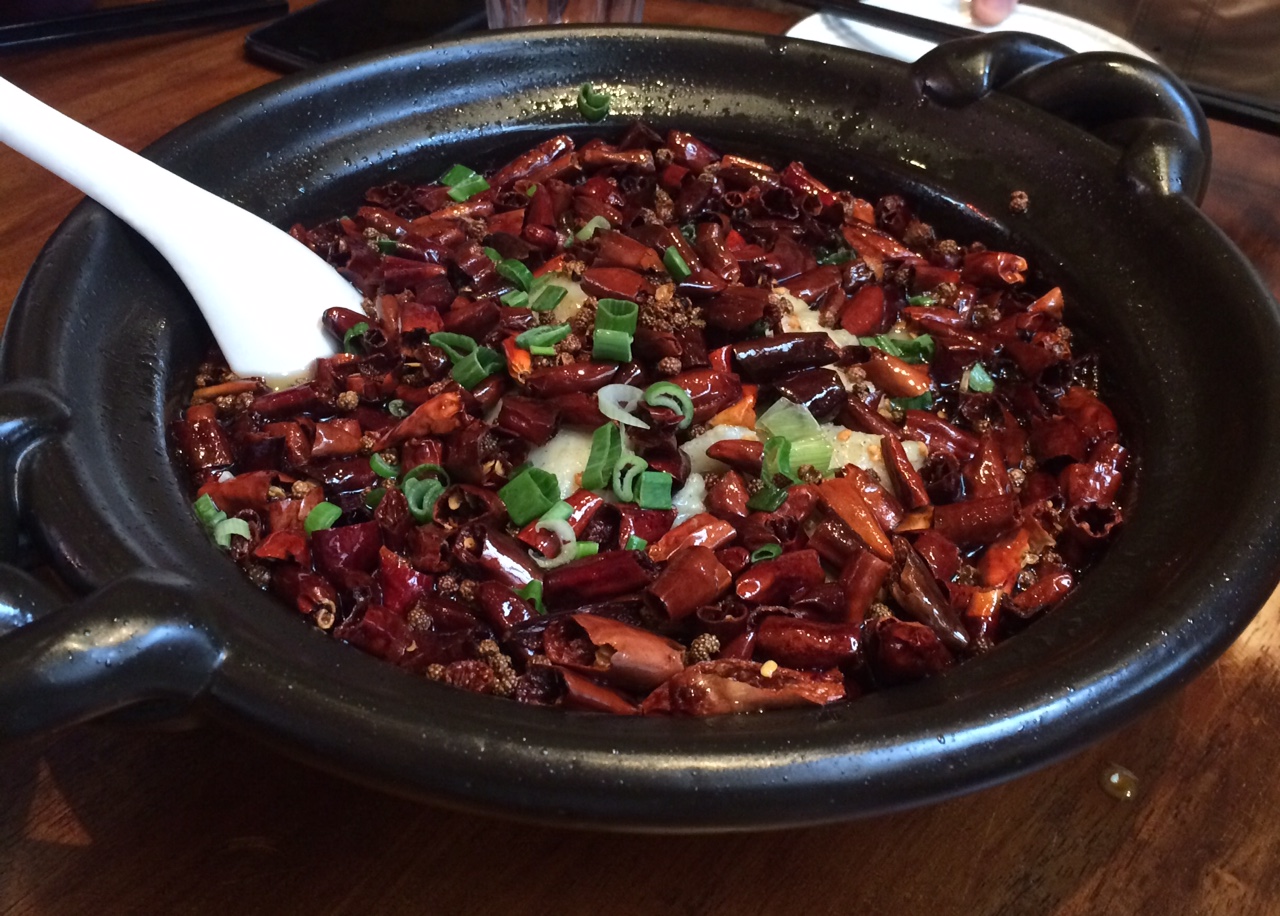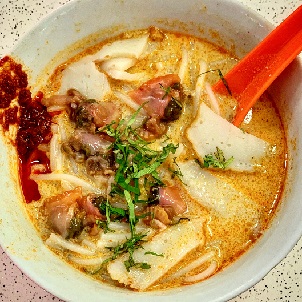Shanghai's 7 Essential Soup Dumplings: Xiaolongbao
Xiaolongbao, the humble Shanghainese soup dumpling, is a marvel of engineering. Skin, thin enough to be translucent, is pleated around seasoned pork and bursting at the seams with umami-rich soup. Further enhanced with a dip in black vinegar and topped with thin slivers of ginger, it is consumed by daintily lifting it by the top where the skin is thickest and raising it to your lips in a soup spoon, lest any spillage occurs during consumption. Living in Shanghai, the birthplace of xiaolongbao, I’m spoiled to indulge in a basket whenever the craving strikes. And it happens more often than I’d like to admit.
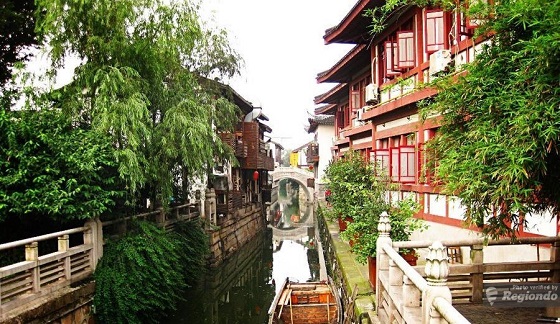
Guyi Garden—the original birthplace of soup dumplings — remains open and well maintained. / Courtesy of http://regiondo.net
Rumored to have originated in Shanghai in the 19th century, legend has it this world-renowned snack started as an experiment by a cake shop owner in Nanxiang who decided to try a riff on his popular steamed bread.
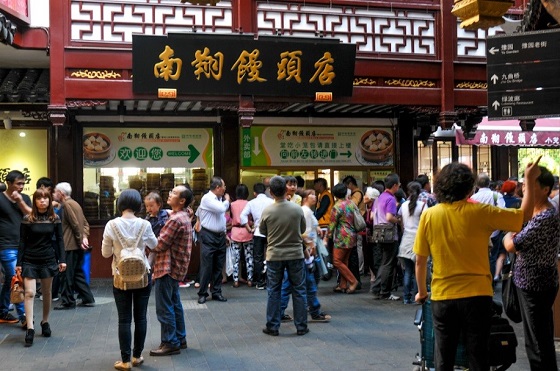
Fans wait hours for a steaming basket of soup dumplings. / Courtesy of www.misopeckish.com
Today, these translucent little snacks keep locals and visitors waiting in hour-long lines just for the chance to tuck into a steamer full. Locals believe a good xiaolongbao is in the ratio of skin, soup and meat. The thinner the skin and more plentiful the soup and meat, the better. But the perfect xiaolongbao is often elusive, a product of the nimble hands of young chefs who roll and pleat behind kitchen glass, affected by the immediacy with which you consume them after steaming, and perhaps also the amount of hunger and anticipation involved.
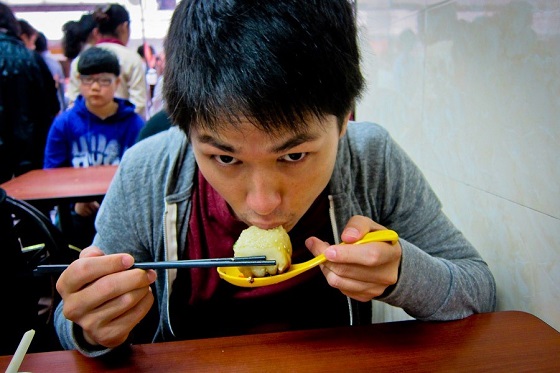
Courtesy of gqtrippin.com
At most mom and pop stalls, no two baskets taste exactly the same, due to these and other variables. And although not necessarily the very best, the places that have mastered consistency of taste, flavor and texture are mega chains like Din Tai Fung and Paradise Dynasty, which is how we are able to enjoy them in their pure form as far away as Melbourne and Toronto.
Can the integrity of a xiaolongbao be distilled down to a science? This is the question a food writer friend, Christopher St. Cavish, set out to answer. He sought to examine the xiaolongbao as a set of features that can be indexed against each other for a purely objective ranking of Shanghai’s top xiaolongbao restaurants. I still remember when he told me about his idea almost two years ago, to create, in his words, a “quantitative interpretation of the colloquial standards for a well-constructed soup dumpling.” I thought he was nuts.
Nevertheless, with a toolkit of a caliper, a digital scale and a lot of patience and perseverance, he managed to spend the next year meticulously/maniacally recording his observations of 52 restaurants, finally producing a beautiful printed documentation of it here together with my friend and former colleague at frog, the talented illustrator Ailadi Cortelletti. Since his publication launch, the project has gone viral, and he has appeared everywhere from Chinese national television to Jonathan Gold’s twitter status as "Shanghai's freakiest dumpling geek.”
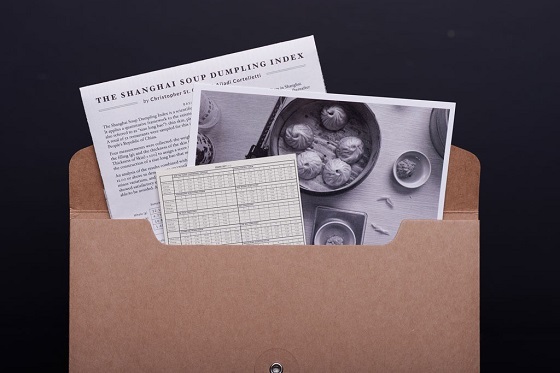
Courtesy of Christopher St. Cavish
Of course, a xiaolongbao is not just a feat of engineering. There is a bit of magic to it as well. That's where the house recipes shine; the quality of the dough, the seasoning of the meat and aspic with any variation of Shaoxing wine, sugar, ginger and spring onion. This is where subjectivity comes in, and why a scientific examination of xiaolongbao can only take you so far.
The following are, in no particular order, a few of the best xiaolongbao restaurants in Shanghai, determined after more than four years of senseless gorging, countless baskets consumed, zero scientific measurements, and based completely on my own taste preferences. For each of my selections, I have included its ranking on Christopher St. Cavish's Xiaolongbao Index and its corresponding data set.
1. Din Tai Fung
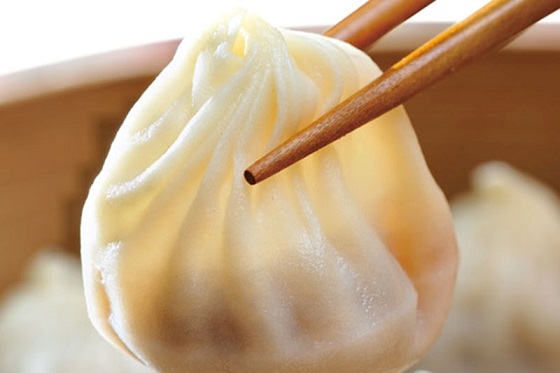
Courtesy of www.foodpoi.com
Class A dumpling on the Xiaolongbao Index with a score of 13.86 | Average Weight: 23.5g | Average Soup 5.02g | Average Filling 9.39g | Average Skin 1.04mm
First of all let’s talk about DTF. It is a global chain but cannot be knocked for that simply because of its remarkable accomplishment in standardization, efficiency and consistency. Founded in 1972 by a husband and wife team, it burst onto the global scene in the early ’90s when it caught the attention of Japanese department store Takashimaya, which helped it apply standardization practices and expand across Japan. But it was really put on the map by famed chef and godfather of Chinese food Ken Hom when he lauded DTF in an article for the New York Times that named it one of the "Top 10 restaurants in the world,” hype they have managed to ride until today. Later, with the development of an enormous central kitchen in Taiwan and a standardized menu, DTF was able to expand even quicker to more than four dozen restaurants in China, Japan, Hong Kong, Singapore, Korea, Indonesia, Malaysia, Australia and the United States.
If you live outside of Shanghai, this is probably your best bet to taste a truly good xiaolongbao. The skin is thin, and each bao has at least 18 pleats every time. You can get original pork flavor, pork with crab roe, shrimp, etc. The combination of complete standardization and a rigorous training program for staff ensures the same delicious bite every single time.
One basket of 8 pork is 58 RMB
2. Paradise Dynasty
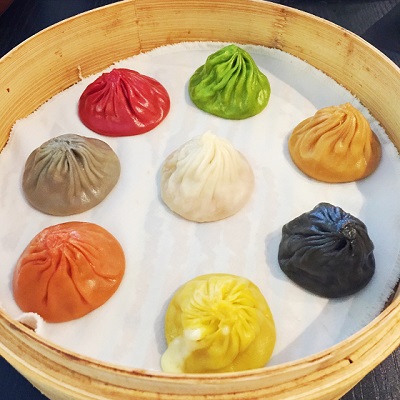
Courtesy of www.jingtheory.com
Class A dumpling on the Xiaolongbao Index with a score of 15.63 | Average Weight: 26.97g | Average Soup 4.83g | Average Filling 12.65g | Average Skin 1.12mm
Yes, another large chain. This restaurant group started in Singapore and has since expanded to China, Malaysia, Indonesia, Japan and Hong Kong. These guys also serve a consistently great xiaolongbao, but the attraction here is “the world's first fusion baos," with innovative flavors like ginseng, cheese, crab roe, garlic, loofah, Sichuan mala, foie gras and black truffle.
I held out on trying these for a long time, thinking they were a bit gimmicky, but when I finally gave in for the sake of research, I found them thoroughly enjoyable. Each of the flavors distinctly taste as they should, but don't overwhelm the taste of the pork. The skin is thin and are colored with what the restaurant claims are natural vegetable juices. I couldn't even pick a favorite.
One basket of 8 is 58 RMB
3. Jia Jia Tang Bao
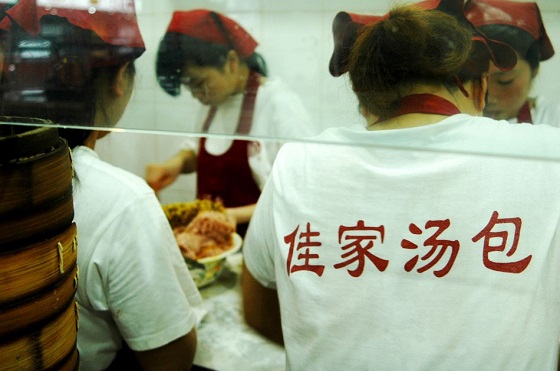
Courtesy of www.jingtheory.com
Class A dumpling on the Xiaolongbao Index with a score of 12.49 | Average Weight: 26.26g | Average Soup 5.78g | Average Filling 8.6g | Average Skin 1.15mm
Now we get into more “local” restaurants, although these are still chains in China. For some background, the xiaolongbao can be broken down regionally, with Nanjing, Shanghai and Suzhou/Wuxi being the dominant styles. They were originally invented in the neighboring town of Nanxiang, and tourists still flock to places like Nanxiang Xiaolong in Shanghai's Old Town for a taste of the traditional version, which has thicker skin and less soup.
There's also the Suzhou/Wuxi style with its sweeter filling and larger dumpling. But it’s the Nanjing style, smaller, almost translucent skin with less meat that has become the preferred style of modern Shanghainese, according to their votes on Chinese restaurant ratings site Dianping. Of this style, Jia is the most well known in Shanghai, and has perfected this in its delicate wrapper and well-seasoned meat and soup. The hordes of people in line at its Huanghe Road location every day would agree.
One basket of 12 crab roe and pork is 27 RMB
4. Lin Long Fang
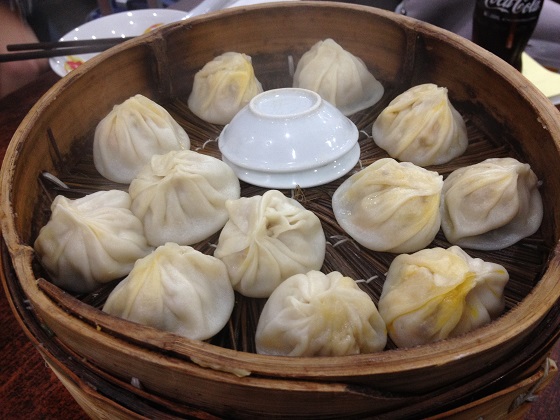
Courtesy of www.jingtheory.com
Class A dumpling on the Xiaolongbao Index with a score of 12.38 | Average Weight: 23.29g | Average Soup 3.86g | Average Filling 9.02g | Average Skin 1.04mm
From the same owners as Jia Jia, this one is superior because it's less known and therefore less hectic. The product is pretty much exactly the same. The original location on a chill stretch of Jianguo Lu with a great old Shanghai vibe has done remarkably well, with more than 2,000 votes on Dianping giving it an 8.5/10 for flavor (no easy feat). They have now opened three additional locations, but I stick to the original. My order is always the same: a basket of crab roe and pork xiaolongbao, a bowl of scallion oil noodles (one of the best I’ve had), and an egg drop seaweed soup (bland but nice to balance with the other flavors). Despite the baos not always looking like a million bucks (those girls in the kitchen aren't as whipped to shape as the masters at DTF), the flavor is always superlative.
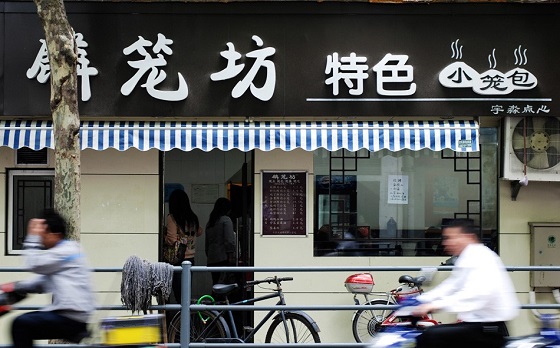
Courtesy of www.jingtheory.com
One basket of 12 mixed flavors: pork, crab roe and duck egg yolk for 26 RMB
5. Holy Cow
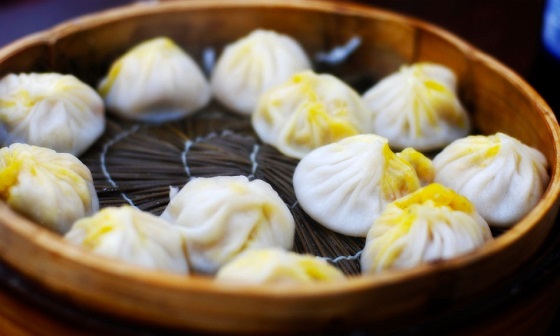
Courtesy of www.jingtheory.com
This last one may be the most interesting newcomer on the scene. Holy Cow is actually a hot pot restaurant, and a great one at that. Full disclosure: Anthony Zhao, the owner and chef, is a personal friend and I would follow him anywhere. He is a celebrity of sorts on the Shanghai food scene, and behind a successful home-style Shanghainese lunch box restaurant called MiXiangYuan and just recently opened this coyly named hot pot place focused on fresh beef and organic veggies from his own farm. Where does the xiaolongbao come in, you ask? Well, he has invented (I claim - as I've never seen this done anywhere else) dunking xiaolongbao into hot pot. The skin is a bit thicker from the boiling rather than steaming, and gets infused with his intensely flavorful mushroom broth, adding another dimension to the xiaolongbao. Highly recommended.
Basket of 5 for 12 RMB
6. Zun Ke Lai
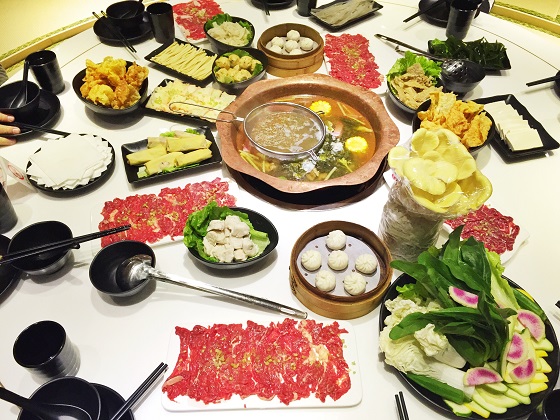
Courtesy of www.jingtheory.com
Class A dumpling on the Xiaolongbao Index with a score of 24.32 (Highest on index) | Average Weight: 27.10g | Average Soup 5.08g | Average Filling 12.42g | Average Skin 0.72mm
You're probably wondering how the top scorer on St. Cavish's Xiaolongbao Index stacks up against the rest. At a whopping score of 24.32, it stands far ahead of its nearest competitor and seems to have an impossibly thin skin at an average 0.72mm holding up an impressive amount of soup and filling. Zun Ke Lai is also a chain with three locations in Shanghai, but this one is the closest to the city center in the Xujiahui Indoor Stadium on Line 1. Plaques on display in the restaurant suggest it has won several awards for its xiaolongbao, particularly the crab roe and pork variety. They were out of crab roe on my last visit, so I could only try the original, but it didn't disappoint. It really was the thinnest skin I'd ever seen, and held up remarkably well with its heavy contents. The soup and filling were umami rich and full of flavor, not the thin, MSG-laden type. It’s impressive how good these were, considering the place is more known for its house yellow croaker noodles. I'll have to go back for those.
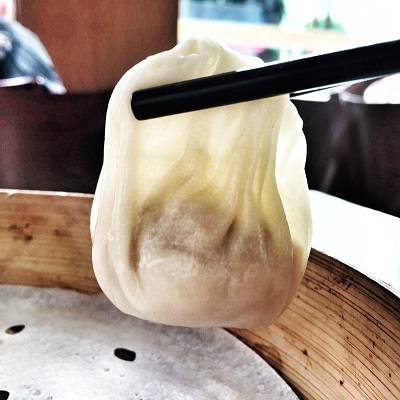
Courtesy of www.jingtheory.com
Basket of 5 pork for 10 RMB
Shenjianbao
You can't talk about xiaolongbao in Shanghai without mentioning its cousin, the shenjianbao, a tougher version with thick, bread-like skin that is shallow fried in a large cast iron pan, giving it a golden crispy bottom and finished with a dash of spring onion and sesame seeds. These are much larger, with mounds of pork inside, and are similarly filled with scalding soup, making it even trickier to eat than xiaolongbao. As usual, follow the protocol of biting a hole in it first while in a soup spoon, I then like to pour a bit of vinegar into and around the bun and slowly make my way through. Trying to attempt in one bite will result in dire consequences for your tongue, face and shirt.
7. Xiao Yang
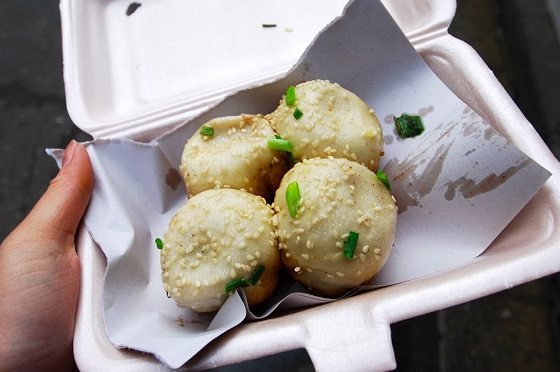
One of the best places to get them is Xiao Yang Fried Dumplings. It is considered the golden standard of shenjianbao in the city and has become so popular since opening in 1994 that it has since grown to 55 locations. Its hot pink signboard is literally everywhere. It is also remarkably consistent, the dumpling cooks are efficient, churning out dozens of dumplings every five minutes. The lines may be long, especially at the Huanghe Road location across from Jia Jia, but it moves fast and you'll always get baos fresh off the pan.
They've recently introduced shrimp shenjianbao, which are a fine specimen as well, filled to the brim with juicy shrimp meat and flowing with pork juices. As with the xiaolongbao, enjoy it with a liberal dash of black vinegar.
Order of 4 pork for 6 RMB and order of 4 shrimp for 16 RMB
Category:
Recommended features by ExtremeFoodies
